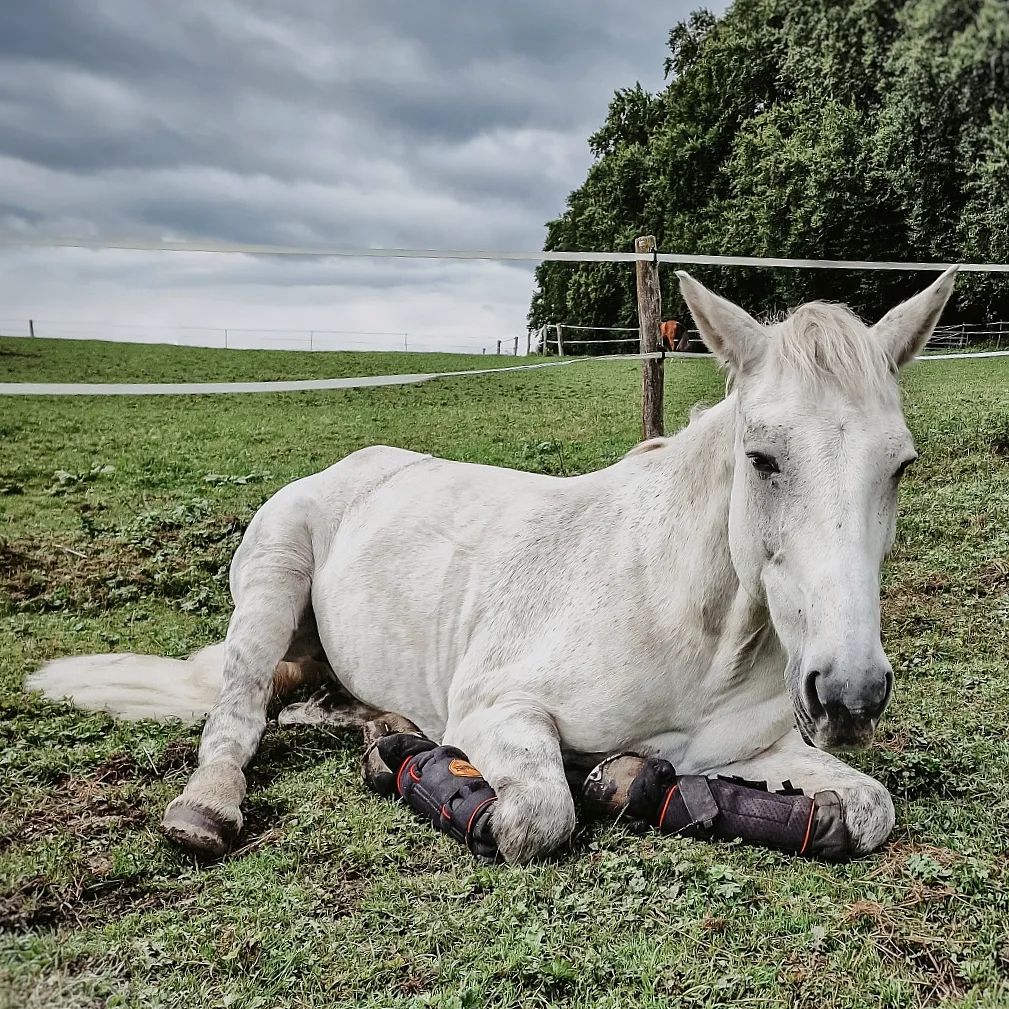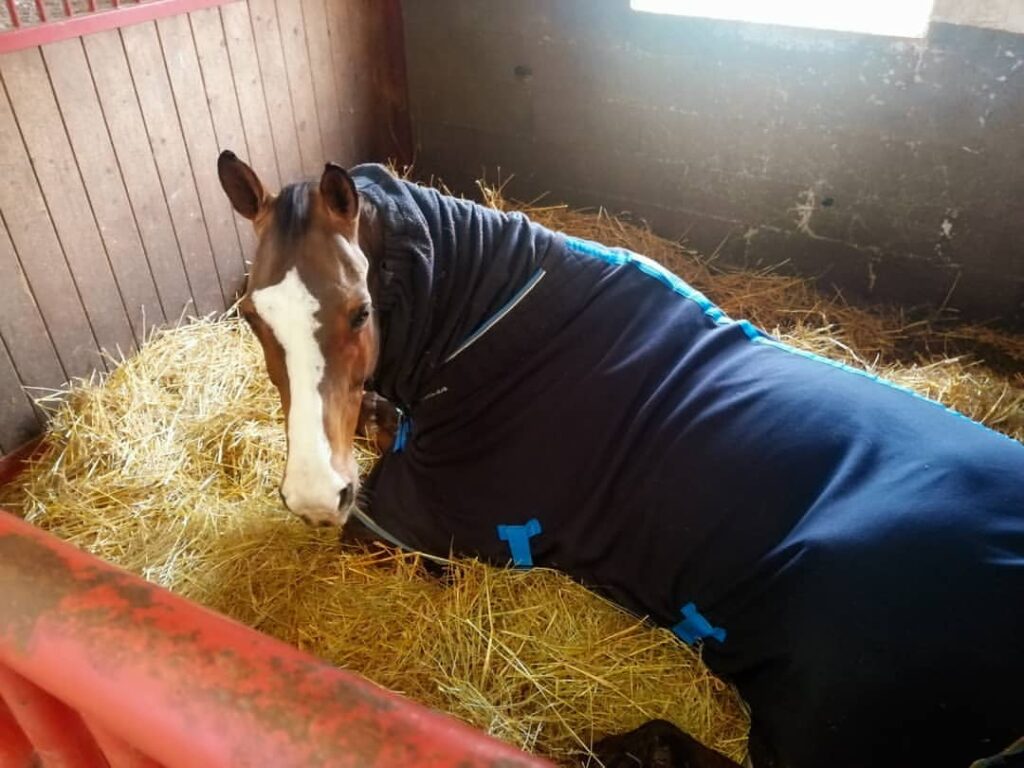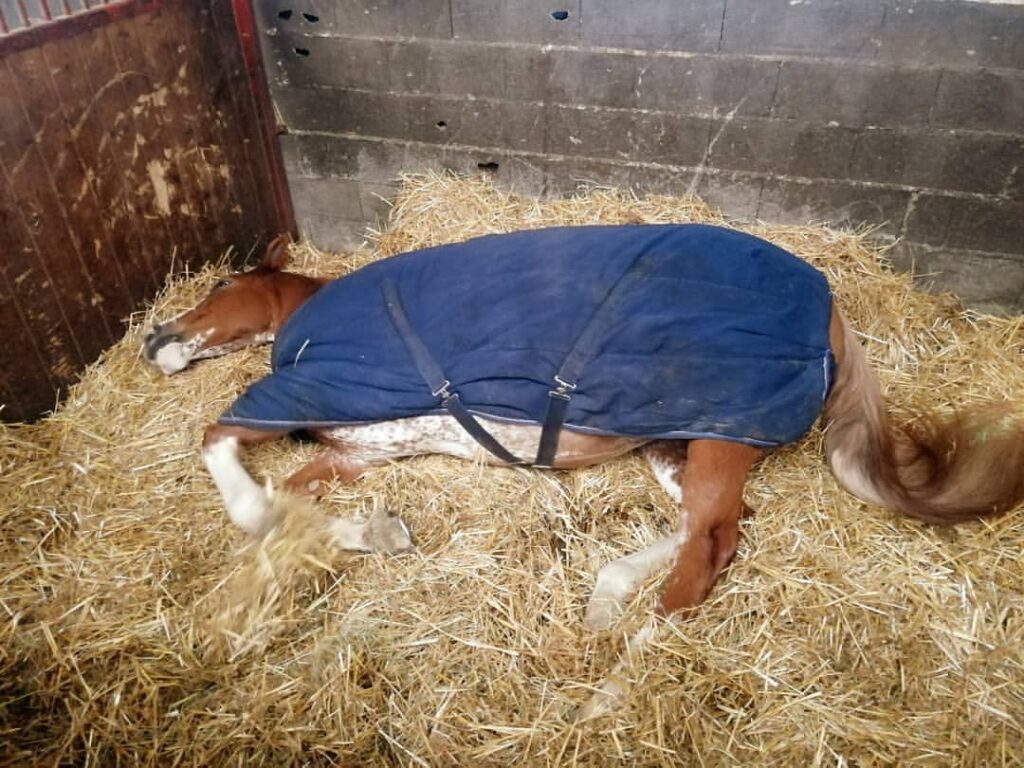
Horses have a unique sleeping pattern that is different from humans. Contrary to popular belief, horses do not sleep standing up all the time. In fact, they only spend about 15% of their sleep cycle standing up.
They do not have a specific time of day when they sleep, but rather take short naps throughout the day and night. Horses can doze off while standing up, but they require a certain amount of deep sleep that can only be achieved by lying down. During this time, their muscles fully relax, and their autonomic nervous system slows down.
Basic Understanding of Horse Sleep
Horses require sleep to function properly, just like any other animal. In this section, we will look at the basics of horse sleep, including how long horses sleep, how they sleep, and the different stages of sleep.
How Long Do Horses Sleep?
Horses need anywhere from 30 minutes to three hours of REM sleep per day, but that only accounts for a small part of their rest habits. In total, most horses need 5-7 hours of sleep in a 24 hour period. However, horses do not sleep in one long stretch like humans do. Instead, they take short naps throughout the day and night, which adds up to their total sleep time.
Horses are unique in that they can sleep while standing up. Their stay apparatus, which is a combination of muscles, tendons, and ligaments, allows them to lock their legs in place and stay standing while they rest. This is a survival mechanism that allows them to quickly escape predators if needed. Horses also have the ability to lay down and sleep, but they will only do so if they feel safe and comfortable.
The Different Stages of Horse Sleep

Horses have three distinct phases of sleep: drowsiness, slow-wave sleep (SWS), and rapid eye movement (REM) sleep. During the drowsy stage, a horse will often stand with its head lowered, eyelids closed, and one hind leg resting. In SWS, horses may remain standing by locking the stay apparatus. In REM sleep, horses will lay down and enter a deep sleep where their eyes move rapidly.
Sleeping Positions of Horses
Horses have fascinating sleeping patterns and positions. They sleep both standing up and lying down, but they spend most of their sleeping hours standing up.
Standing Sleep
Horses have a unique ability to sleep while standing up. They have a group of muscles called the stay apparatus that allows them to lock their legs in place and doze off. This mechanism allows them to rest their muscles without risking injury from lying down. They can sleep while standing for several hours a day, but they do not enter into deep sleep in this position.
Lying Down Sleep
When horses do sleep lying down, they usually sleep on their sides with their legs tucked under their bodies. They also sleep in a slightly more upward position, with their legs curled under them and off to the side. Horses may lie down for short periods of time, ranging from a few minutes to a few hours. They typically lie down to enter into a deep sleep, which is necessary for their overall health and well-being.

Factors Affecting Sleep
Several factors can affect a horse’s sleeping patterns and positions. Diet, temperature, workload, gestation, and gender can all impact the length and type of sleep a horse gets. Young horses tend to sleep more than mature horses, while senior horses may doze more frequently. Additionally, the horse’s environment can also impact their sleeping habits. A safe, stress-free environment, such as a secure stable or open pasture, is the best place for a horse to doze off.
Sleeping Patterns in Horses
Horses are unique animals in terms of their sleeping patterns. Unlike humans, horses do not have a consolidated, single-stretch sleep period of about eight hours. Instead, they take shorter naps throughout the day and night.
Rapid Eye Movement Sleep
Horses experience both rapid eye movement (REM) and non-rapid eye movement (NREM) sleep, just like humans. During REM sleep, horses display twitching of the eyes and muscles, indicating that they are in a deep sleep.
Non-rapid Eye Movement Sleep
During NREM sleep, horses typically stand up or lie down. They can sleep while standing up due to the stay apparatus, which is a system of muscles, tendons, and ligaments that work together to help the horse remain standing.
Horses’ sleeping patterns are irregular, with patches of each type of sleep taken throughout the day and night. Periods of wakefulness and rest happen intermittently, and what matters is the total amount of sleep per day rather than when it is taken.
Sleep patterns are very much dependent on the environment and age. Foals lie down for frequent naps and spend about half of their day sleeping until they are about three months old. As the foal gets older, the frequency of the naps becomes less, and they are more likely to stand rather than lie down.
Overall, understanding horses’ sleeping patterns is important for their health and well-being. Providing a comfortable and safe environment for horses to rest is crucial to ensure that they get the sleep they need to stay healthy and happy.
Factors Affecting Horse Sleep
Horses require a considerable amount of sleep to maintain their physical and mental health. However, several factors may affect their sleeping patterns. These factors include age, health, and environment.
Age
The age of the horse is a crucial factor that affects its sleeping patterns. Young horses tend to sleep more than mature horses, while senior horses may doze more frequently. Foals, for instance, require up to 16 hours of sleep per day. In contrast, adult horses require between two and four hours of sleep per day.
Health
The health of the horse is another essential factor that affects its sleeping patterns. Horses that are in pain or discomfort may find it challenging to sleep. For instance, horses with laminitis may find it difficult to lie down, leading to sleep deprivation. Similarly, horses with respiratory problems may experience sleep apnea, which affects their sleep quality.
Environment
The environment in which the horse lives also affects its sleeping patterns. Horses require a quiet and comfortable environment to sleep soundly. Loud noises, bright lights, and extreme temperatures may disrupt their sleep. Therefore, it is essential to provide a comfortable and safe environment for horses to sleep.
In conclusion, several factors may affect the sleeping patterns of horses, including age, health, and environment. Horse owners must provide a conducive environment and ensure that their horses are healthy to promote good sleeping habits.

Common Sleep Disorders in Horses
Horses can suffer from various sleep disorders that can affect their overall health and wellbeing. Here are some of the most common sleep disorders in horses:
- Sleep Deprivation: Sleep deprivation in horses can be caused by a variety of factors such as pain, illness, management inadequacies or ethological needs not being appropriately met. Recumbent sleep deprivation, in particular, can lead to rapid eye movement (REM) sleep deficiency. This can result in horses becoming irritable, depressed, and more prone to accidents.
- Sleep Apnea: Sleep apnea in horses is characterized by pauses in breathing during sleep. This can be caused by obesity, upper respiratory tract infections, or other medical conditions. Horses with sleep apnea may snore loudly, wake up frequently during the night, and exhibit signs of fatigue during the day.
- Narcolepsy: Narcolepsy is a sleep disorder characterized by sudden and uncontrollable episodes of sleep during the day. Although rare in horses, it can be caused by a genetic predisposition or a brain injury. Horses with narcolepsy may suddenly collapse or fall asleep while standing.
- Insomnia: Insomnia in horses is characterized by difficulty falling asleep or staying asleep. This can be caused by pain, anxiety, or other medical conditions. Horses with insomnia may exhibit signs of fatigue during the day, become irritable or depressed, and have a decreased appetite.
It is important to note that sleep disorders in horses can have serious consequences if left untreated. If you suspect that your horse is suffering from a sleep disorder, it is recommended that you seek veterinary advice as soon as possible.
Importance of Sleep for Horses
Sleep is a crucial aspect of a horse’s overall health and well-being. Horses require adequate sleep to maintain their physical and mental health. Horses that do not get enough sleep can suffer from various health problems and behavioural issues.
During sleep, horses rest their muscles and allow their bodies to repair and regenerate. This is especially important for horses that engage in physically demanding activities such as racing or jumping. Adequate sleep also helps horses maintain a healthy immune system, which is essential for fighting off infections and diseases.
Horses that do not get enough sleep may exhibit behavioural issues such as irritability, aggression, and decreased performance. Lack of sleep can also lead to physical problems such as weight loss, muscle weakness, and poor coat condition.
It is important to note that horses have unique sleep patterns compared to other animals. Horses sleep for short periods throughout the day and night, with each sleep phase lasting only a few minutes. They also have the ability to sleep while standing up, thanks to a unique mechanism in their legs that allows them to lock their joints.
In conclusion, adequate sleep is essential for a horse’s overall health and well-being. Horse owners should ensure that their horses have a comfortable and safe sleeping environment and that they are getting enough rest throughout the day and night.
Conclusion
Horses are unique animals that have adapted to sleep in a way that allows them to quickly flee from predators. They are able to sleep both standing up and lying down, and they can do so for short periods of time. Horses typically sleep for short periods of time throughout the day and night, and they prefer to sleep in a safe and comfortable environment.
One of the most interesting things about how horses sleep is that they are able to sleep with their eyes open. This allows them to keep an eye out for potential predators while they rest. However, horses usually close their eyes when they are in a deep sleep.
Another interesting fact is that horses do not experience REM sleep in the same way that humans do. REM sleep is the stage of sleep in which most dreaming occurs, and it is associated with the consolidation of memories and learning. Horses do experience REM sleep, but it is thought to occur in short bursts throughout the day and night, rather than in one long period of sleep.
Overall, understanding how horses sleep is important for anyone who works with these animals. By providing a safe and comfortable environment for horses to rest, it is possible to help them stay healthy and happy.
